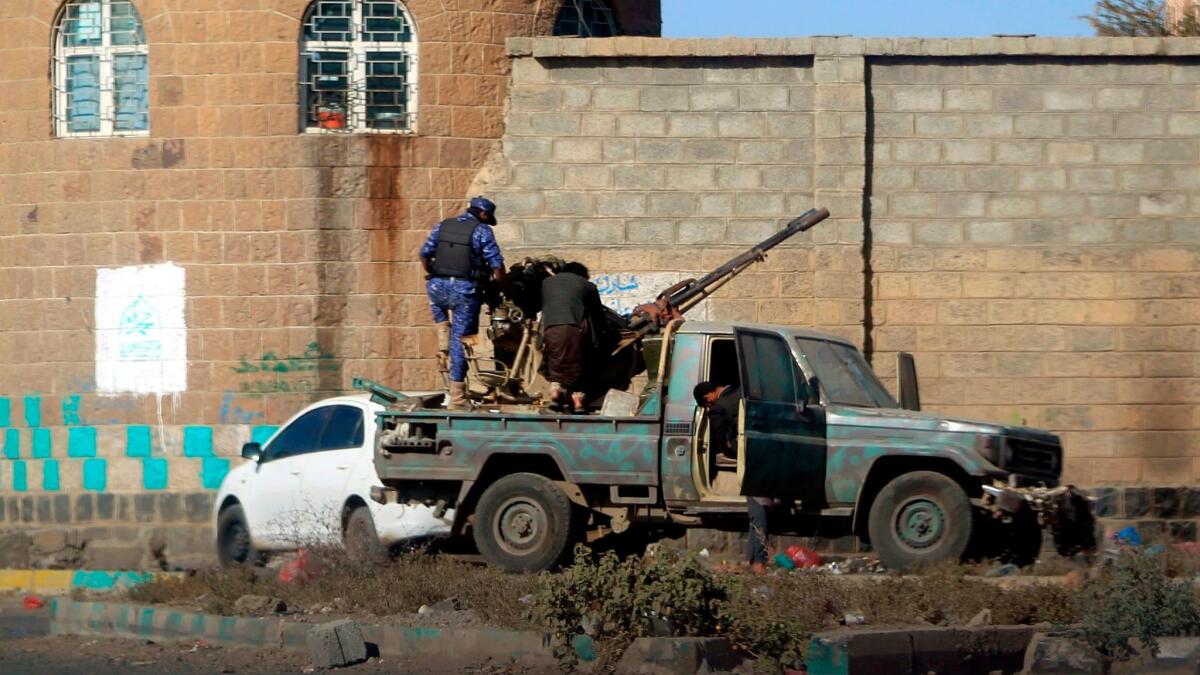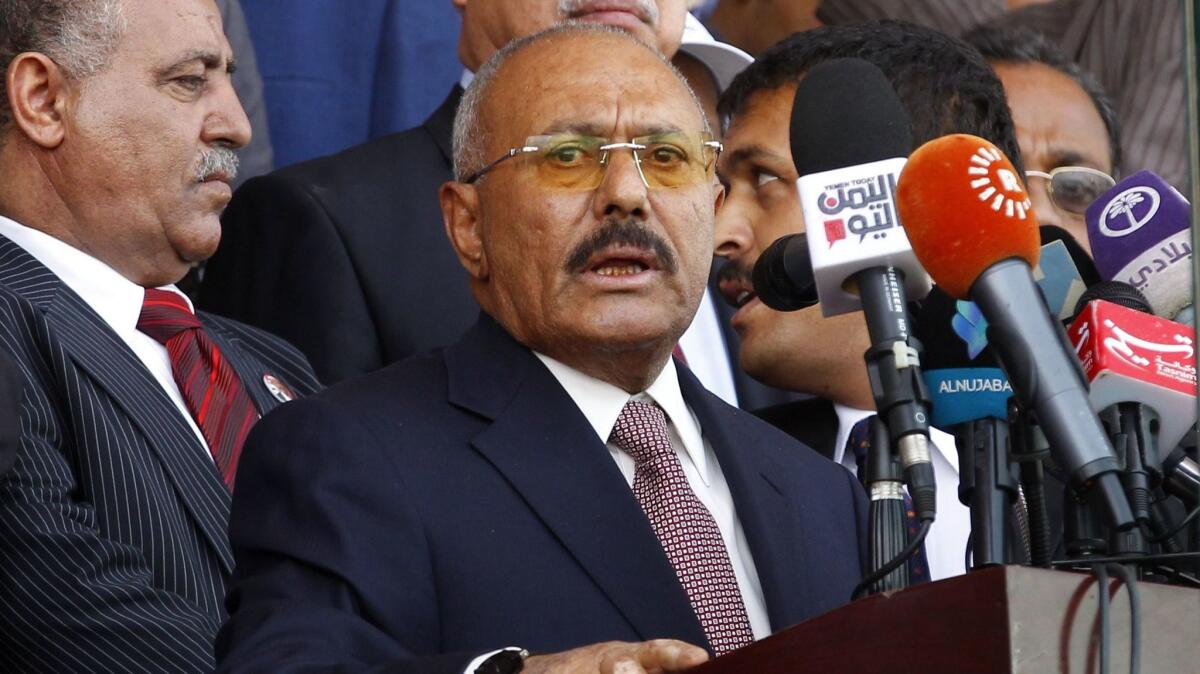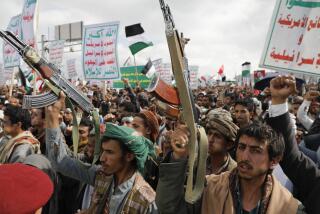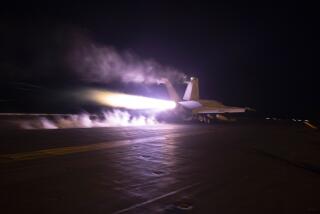Yemen’s deposed strongman says he is open to talks with Saudi coalition

Yemen’s deposed strongman Ali Abdullah Saleh called Saturday for a popular revolt against his former rebel allies and said he was open to dialogue with the coalition of Persian Gulf states they have been battling for more than two years.
Saleh’s offer to “open a new page” with the Saudi Arabia-led and U.S.-backed coalition came as violent clashes between his followers and the rebels known as Houthis entered a fourth day, signaling the unraveling of the alliance that controls Yemen’s capital, Sana.
The coalition fighting on behalf of Yemen’s internationally recognized government welcomed Saleh’s overture, raising hopes that a resolution might be found to a civil war that has killed more than 10,000 people, displaced over 3 million and pushed the Arab world’s poorest nation to the brink of famine.
“Saleh is a veteran of negotiations with all of the parties in Yemen,” said Jon B. Alterman, who heads the Middle East Program at the Center for Strategic and International Studies in Washington. “Having him working for resolution, and diminishing the Houthis’ bargaining position, helps move this from a stalemate. But still, it will require a willingness to negotiate rather than an effort of one side to beat the other into submission.”
The Houthis, who are aligned with Saudi Arabia’s archrival, Iran, accused Saleh of staging a coup and vowed to continue fighting the “forces of aggression.”

The rebels surged out of their northern strongholds in September 2014 and seized control of Sana with the help of rogue elements of the armed forces still loyal to Saleh. Six months later, Saudi Arabia assembled a military coalition to restore power to Saleh’s successor, President Abdu Rabu Mansour Hadi, who has set up a parallel government in Yemen’s southern port city of Aden.
Analysts said the coalition likely had a hand in the clashes that erupted in recent days in Sana.
“The Saudi coalition has been exploring ways to split Saleh from the Houthis for many months,” Alterman said.
The International Committee of the Red Cross said dozens of people have been killed and hundreds injured in the fighting.
Residents of the capital described heavy clashes Saturday in the southern residential district of Hadda, where a number of Saleh’s relatives have homes, and around Houthi-held government institutions elsewhere in the city. Heavy explosions and gunfire reverberated through deserted streets, and plumes of dark smoke billowed into the sky.
Ahmed Hadi, a 24-year-old Hadda resident, said his family had barely slept the past three nights. “Today in the morning I wanted to buy things for the family but found that most streets are blocked, prices are high, and I can’t find cooking gas,” he said. “The kids are afraid and crying most of the time.”
By nightfall, Saleh’s supporters, who include members of the Republican Guard and tribal fighters, appeared to be in control of the southern parts of the capital and some outlying districts. But the Houthis were said to be regrouping and sending for reinforcements.
As darkness enveloped the city, coalition warplanes roared overhead and unleashed their payloads on Houthi targets.
Both sides have traded blame for the fighting, which reportedly began as a dispute over the use of a mosque named after Saleh, where the Houthis wanted to hold festivities Wednesday in honor of the Prophet Muhammad’s birthday.
In an interview broadcast Saturday on the Yemen al-Youm TV channel, Saleh urged residents and the security forces to rise against the Houthis, whom he blamed for a blockade that has caused critical shortages of food, medicine and fuel, and escalated a deadly cholera outbreak.
“I call on brothers in the neighboring countries to stop the aggression against Yemen and lift the blockade and open all sea and airports,” he said. “We will then open a new page with them … and will deal with them in a positive way.
“What happened in Yemen is enough,” he added.
Saleh, who was ousted in 2011 after more than 30 years in office, insisted he wasn’t interested in making a comeback. But he said Yemen’s parliament was ready for talks with the Saudi-led coalition.
The coalition praised Saleh’s move, which it said in a statement carried by the official Saudi Press Agency would deliver Yemen from “the evils of [an] Iranian terrorist and sectarian militia.”
Shortly after the interview was broadcast, Yemen al-Youm went off the air. An employee, who declined to have his name published for fear of retribution, said Houthis had raided the station.
The Houthis’ leader, Abdel-Malek Houthi, accused Saleh of inviting “sedition, chaos, fighting, hatred, hostility, lies and hypocrisy.” He urged Saleh to “return to reason,” saying the fighting in Sana will benefit only the coalition.
The alliance between Saleh and the Houthis, who have little in common ideologically, had been fraught with suspicion from the start.
After Saturday’s speeches, there will be no turning back, said Mohammed Hassan, a political analyst and columnist who contributes to a number of local publications. “The temporary marriage between Saleh and the Houthi powers is moving to its end.”
Special correspondent Ahmed reported from Sana and Times staff writer Zavis from Beirut.
Twitter: @alexzavis
UPDATES:
7:05 p.m.: This story was updated with additional background and comments from Ali Abdullah Saleh, Jon B. Alterman and Ahmed Hadi.
This article was originally published at 10:25 a.m.
More to Read
Start your day right
Sign up for Essential California for news, features and recommendations from the L.A. Times and beyond in your inbox six days a week.
You may occasionally receive promotional content from the Los Angeles Times.







